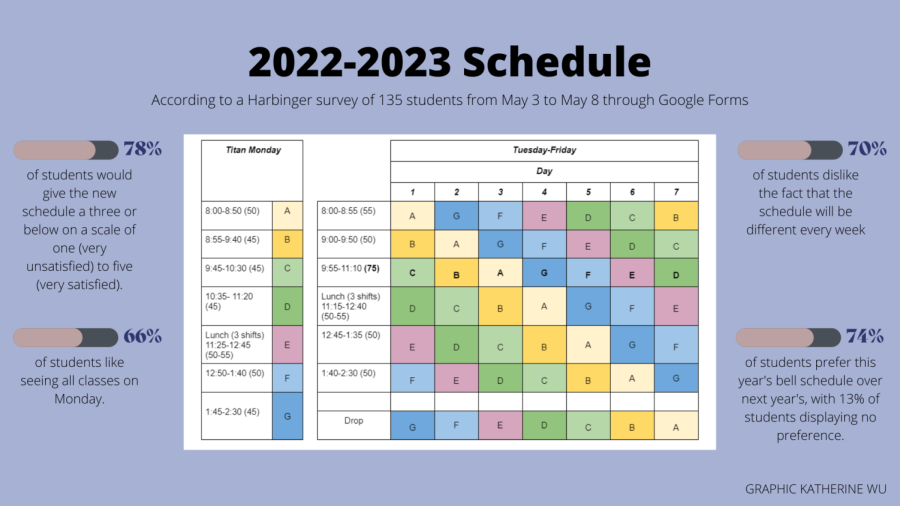Schedule change seeds dissatisfaction in student body
Many students are unsatisfied with the new schedule for the 2022-2023 school year.
June 6, 2022
Many students have expressed discontent with next year’s new bell schedule which was determined with the help of teachers, students and administrators, and will include “double” periods, a seven day rotation and “Titan Monday.”
The bell schedule has changed five times since 2018, partially due to the COVID pandemic, as well as the administration shift to a new principal in 2021.
The first step in creating a new schedule was to survey the school population. Administration surveyed staff members about their preferences in May 2021, while both teachers and students were surveyed in March 2022.
According to Principal Sean Bevan, between the two surveys, about 150 students and 150 teachers responded. However, students and teachers have different opinions on what makes a good schedule.
“[double class periods] were teachers’ top priority in May [2021] and bottom priority in March [2022],” Bevan said. “Students wanted minimum class length.”
Bevan said this disparity in opinions made it difficult to pick a new schedule. He also explained that different departments have various preferences and teachers within departments have contrasting views as well.
Administrators assembled a committee which included three students and several staff members to help decide on a new schedule.
“[The committee’s purpose was to] find the best balance of different priorities,” World Languages teacher and scheduling committee member Shawn Staines said.
Bevan emphasized that there is no perfect schedule, and the committee faced the challenge of identifying options with more benefits than drawbacks. They presented two similar options, both featuring a seven-day, waterfall rotation and double periods, for the faculty to vote on. They narrowly selected the option that included “Titan Monday,” which ensures that all classes meet for a shortened period every Monday to start the week.
Junior Fred Probst was involved in the scheduling committee to provide input on the students’ behalf. Probst expressed that the goal was to find “the best balance.”
Probst believes one of the new schedule’s benefits is double periods; however, he understands that many students will not like them.
“[Doubles] allow for a skipped period each day, and …allows for longer labs in AP sciences, and longer tests don’t have to be spread over two periods,” Probst said.
According to a Harbinger survey of 135 students from May 3 to May 8 through Google Forms, students have mixed feelings of what they see as advantages of the new schedule. Sixty-six percent of students like seeing all classes on Monday, 53% of students like the full rotation of periods and 50% of students like missing one class per day (except “Titan Mondays”).
Some survey respondents said they like the idea of dropping a class most days and that the new schedule will be “a nice change”.
When asked about the disadvantages of next year’s schedule, 70% of students disliked the fact that the schedule will be different every week due to a seven-day rotation on Tuesdays through Fridays, 66% of students disliked “double periods” (lasting 75 minutes) and 41% of students disliked 50 minute average class periods.
One survey respondent wrote, “I do not like the idea of double classes, and I think that they are unnecessary. I also do not like that the pattern is not based on the day of the week, but changes irregularly.”
Another respondent explained their concern with 75-minute “double” periods.
“Having long periods for over an hour present certain advantages mostly for higher level courses but the disadvantages will impact everyone,” the survey respondent wrote. “Teachers and administrators don’t understand the challenge for some students to remain on task and engaged during classes and if these lengths are extended more students will be both roaming the halls and not getting as much from a longer lesson as they would a concise lesson.”
The majority of survey respondents expressed dissatisfaction with next year’s schedule. When asked about how satisfied they were with next year’s schedule on a scale of one (very unsatisfied) to five (very satisfied), 78% of students answered a three or below.
As one survey respondent wrote in regards to next year’s bell schedule, “It seems new, but I’ll get used to it.”










